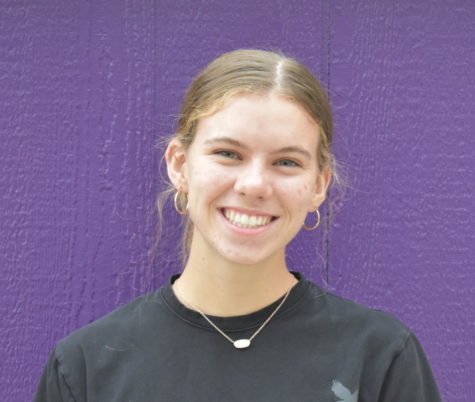Principal Santarelli concerned for our future
In a time where poor behavior has been seen from several students at A-West, principal Geree Santarelli pleads,“I think that we need to get back to kindness and empathy.” She hopes that the school can unify and learn to respect one another again.
To function effectively in society, there must be rules. Similarly, to function effectively in high school, there must be rules.
Principal Geree Santarelli agrees, “No matter where you are, there’s rules.”
After nearly two years of wonky schedules, isolation and all things pandemic, A-West has seen a severe deterioration in student behavior. From active protest to the dress code, to disrespect of teachers and administrators, several students are not backing off of this extended tantrum.
“Everybody’s angry,” Santarelli describes.
At the root of the problem, Santarelli believes many students missed out on vital “socialization” while they were away from school and people. Now, the effects of this are extremely prevalent at A-West and among the community.
For example, A-West students were recently banned from Walgreens for disrespectful behavior and theft, a parallel of the poor behavior flooding the halls of the school.
A major area of concern comes with the school dress code. Everyday, administrators receive backlash for enforcing the dress code. In a survey of 109 A-West students and staff, 73 percent say there should not be a dress code while the other 27 percent think there should be.
Santarelli explains the reasoning behind keeping this dress code: “The dress code has been approved by our community.”
Reed Brzezinski, a senior at A-West, has been a big opponent of the dress code this school year. Everyday, he gives lollipops to students breaking the dress code to “reward” them.
“It is an ongoing protest against the dress code,” Brzezinski explains.
However, the disrespect administrators receive for enforcing the dress code has been at its worse this year. Even when asked to cover or change, students cover their cropped shirts with jackets, just to remove them when they get to class.
“I am just tired of fighting the battle. It’s not appropriate. We are not a beach. We’re not Waterworld. We’re not a club. We are a high school,” Santarelli describes.
She stresses that students should follow the dress code just like teachers are required to: “We get a different level of behavior depending on how we present ourselves. This is a place of business. It is the business of education.”
Students tend to believe that rules at school are not to protect them but are meant to punish them. They play the victim, and they don’t take personal responsibility for their own actions.
Many students respond with, “you’re targeting me.”
Santarelli makes it clear, “It’s not targeting. I will address anyone who is not dressed appropriately.” She continues, “I think we’ve created a society of victims instead of seriously looking at our own behaviors and saying ‘What am I doing to draw attention to myself’.”
However, another big problem Santarelli sees at A-West is the use of phones, and specifically social media.
“Social media is the bane of high school principals’ existence,” she expresses.
Many students behind a screen showcase “mean spiritedness” toward others just because they can. Cyberbullying has been heightened since the pandemic. In addition, students often don’t even talk to each other anymore because their faces are glued to their phones.
“How many times do you see kids’ faces anymore? If they are by themselves, they’ve got a phone in front of them,” Santarelli says.
Santarelli has encouraged teachers to have students put their phones in the phone pockets to limit distractions in the classroom, but social media tends to keep people wondering, “What am I missing.” Santarelli hopes to limit that urge so students can live in the moment.
“It takes a strong person to say, ‘I don’t need social media,’” Santarelli argues.
It all bubbles back down to personal accountability. Everybody in life, especially at A-West, has the ability to choose how they want to act. Whether or not they follow the rules, treat others with kindness and respect, or take time away from their phones is completely up to them.
“Personal accountability is the number one thing you have as an individual,” Santarelli expresses.
Overall, Santarelli is worried about the future, and has hopes for both students, parents and the community, but she stresses that it isn’t everyone that is part of the problem. Most people at A-West are “doing the right things for the right reasons,” she says.
As for the rest of the year, “I think that we need to get back to kindness and empathy,” Santarelli explains.
It is clear that our principal is concerned about the future of the world, and wants to do what is necessary now to help students be successful. To stress her point, Santarelli has sent several emails encouraging the community, both students and parents alike, to make these changes to help improve the culture at A-West.
“Look up from your phone, see what the world has to over. Be grateful. Be thankful for the things around you. Put yourself in someone else’s shoes,” advises Santarelli.

Alex Larson is a senior at A-West this year. She enjoys running, singing, writing and playing piano. Her favorite type of story to write is an op-ed, because...



